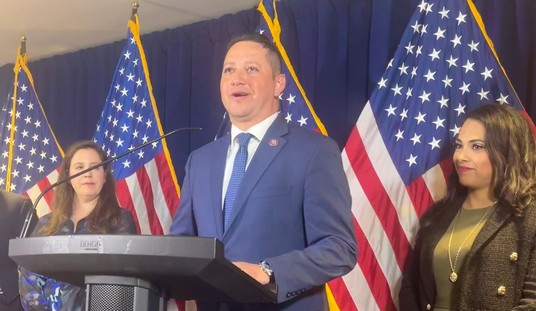
Last week, House Minority Leader Kevin McCarthy told Fox News‘ Maria Bartiromo, “I do not believe that Jim Comey will get off.” All of us long-suffering Trump supporters were pleased to hear that.
Unfortunately, Real Clear Investigation’s Paul Sperry published an article on Monday which suggests that DOJ Inspector General Michael E. Horowitz’ report on the FBI’s alleged FISA abuse may disappoint.
According to Sperry, skeptics are saying that despite the fact that Horowitz, an Obama appointee, is highly respected, he is, at heart, a Democrat. He is “more political than widely believed, and may be naturally inclined to protect the FBI and the DOJ. Their main complaint is that he pulls his punches…His work has long been hampered by biases, conflicts and a tendency to play favorites.”
As an example, they cite his conclusions in the June 2018 report on the FBI’s investigation of Hillary Clinton’s use of a private server during her tenure as Secretary of State. Horowitz, who worked under James Comey in the SDNY in the 1990s, found that while “many of Comey’s explanations for his dubious actions were “unconvincing,” he stopped short of saying that Comey had lied to investigators.” Specifically:
Comey asserted implausibly that he delayed acting on a mountain of new Clinton email evidence discovered on a laptop in New York because he was never briefed about it until nearly a month after his top aides found out about it in September 2016.
In probing whether Comey illegally leaked classified information to the New York Times, Horowitz in the end accepted his argument that the memo of a conversation with President Trump was sensitive but “not classified” – even though the memo contained information about the FBI’s ongoing counterintelligence investigation of the president’s national security adviser.
Sperry spoke to Chris Swecker, a 24-year FBI veteran, who said, “I see a pattern of him pulling up short and trying to be a bit of a statesman instead of making the hard calls…I’m afraid he’s going to do the same thing with the FISA report – a finding that sounds tough, but in the end, ‘No harm, no foul.'”
They also cite his work as a campaign volunteer for Democratic candidates in college and several subsequent campaign contributions to Democrats. Horowitz’ wife is “a former political activist who helped run campaigns for liberal Democrats before producing programming for CNN out of its Washington bureau.”
Sperry interviewed several former inspectors general, and none of them expect Horowitz will issue a criminal referral against Comey. They also pointed to a law which requires an inspector general to “report evidence of potential violations of federal criminal law to the Attorney General as soon as it is uncovered, rather than deferring such action until the completion of their report.” If I recall correctly, Horowitz issued a criminal referral for Andrew McCabe to then-Attorney General Jeff Sessions months before his report was released.
Sperry and his team, aided by “seasoned federal investigators, deconstructed previous probes by his office, combing through the footnotes and appendices of his reports. RCI found numerous instances in which Horowitz stopped short of pursuing evidence and was content to take high-level officials at their word, even in the face of conflicting evidence.” They “uncovered [Horowitz’] tendency to defer to those in authority.”
During his investigation into Clinton’s use of a private server, “Horowitz relied on key Clinton aides produce evidence on their own.”
He repeatedly declined to use his subpoena power, trusting key players to produce evidence on their own. He allowed the two lead FBI officials who ran both the investigation of Clinton and the probe of the Trump campaign — FBI Counterintelligence Chief Peter Strzok and FBI lawyer Lisa Page – to decide which communications on their personal devices and email accounts were FBI “work-related” and which were “personal,” according to footnotes and Strzok’s testimony. Both claimed they couldn’t find any work-relevant evidence to hand over, even though text message exchanges between them on their FBI phones indicated they had discussed FBI meetings in private Gmail accounts and iMessages.
Horowitz subsequently learned through interviews that Strzok drafted classified investigative documents and communicated with Page about them on their private email in violation of department rules, which require officials to communicate through government channels — the same basis for the Clinton email probe. Yet neither was compelled to turn over the emails.
“The inspector general and I arranged an agreement where I would go through my personal accounts and identify any material that was relevant to FBI business and turn it over,” Strzok said in testifying before Congress. “It was reviewed. There was none. My understanding is the inspector general was satisfied with that action.”
Horowitz never referred Strzok for criminal sanctions for maintaining court-sealed documents on an unsecure computer. Strzok was nonetheless fired last year by the bureau for misconduct. He is now suing the department for unlawful termination.
The IG also failed to demand access to Comey’s private Gmail account, even though he, too, used it for official FBI business.
Horowitz is widely credited with uncovering biased texts sent by Strzok and Page, who were also having an extramarital affair, on their bureau-issued phones. In those texts they rooted for Clinton to win the 2016 election and promised to “stop” Trump – at a time when they were supposedly investigating the presidential candidates. But Horowitz found those messages only after congressional Republicans pressed him to recover several months’ worth of Strzok-Page texts the FBI claimed were missing from its archives. The inspector general brought the texts to the attention of Special Counsel Robert Mueller, who’d retained the two agents for his investigation, on July 27, 2017. But he kept the explosive information from Congress for the next five months, and shared it with legislators only after the media found out about it.
The inspector general still has not recovered all the missing texts. It appears he has given up trying, having accepted the FBI’s explanation that the records were lost in a technical snafu the bureau blames on the IT vendor that wrote the software for its archiving system.
The report rebuked Strzok and Page over their political bias, however, he did not believe that their bias influenced their investigative decisions. The report said that they “exercised extremely poor judgment.”
Swecker told Sperry that “Strzok’s state of mind was clear. That his bias was coming into play was an easy call to make, but Horowitz danced around it.”
Horowitz found that Clinton had been “extremely careless” but not “grossly negligent.”
Sperry cites at least a dozen more instances in which he believes Horowitz gave the benefit of the doubt to the various subjects of his investigations. He also discusses Horowitz’ past praise of Comey, his experience working under then-Attorney General Janet Reno and her then-deputy, Eric Holder and finally his leniency on then-Attorney Eric Holder in the Fast and Furious case. (Here is the link.)
It should be noted that any officials who are mentioned in an IG report are offered the opportunity to “make changes, reviewing it for accuracy.” That means that Comey, Strzok, McCabe, Page and several others will take a whack at it before it’s released. This often has the effect of “watering down” the report. (Why wasn’t Trump availed a chance to review the whistleblower’s complaint for accuracy before it was made public?)
I clearly remember the anticipation of Horowitz’ June 2018 report on Hillary Clinton’s email investigation. We all had high hopes for that, but in the end, we were let down.
It’s frustrating to think that, after working on this investigation for 18 months, Horowitz might not deliver the goods for us.
Still, Horowitz did issue a criminal referral for Comey in July for mishandling sensitive information. The fired FBI Director had given memos he’d written after each meeting with President Trump to his law professor friend with instructions to leak them to the New York Times. He had hoped that once the Times reported the story, then-acting Attorney General Rod Rosenstein would appoint a special counsel. As we all know, Comey’s plan worked. The DOJ chose not to pursue the IG’s criminal referral because there was too much uncertainty about Comey’s intent. Many of us believe that the DOJ has their sights on Comey’s “bigger crimes.”
Rumor has it that Horowitz found that the FBI’s FISA applications for the original Carter Page warrant and three subsequent renewals were obtained fraudulently. I don’t see how he could conclude anything else. In any case, we’ll find out soon.
In the meantime, Attorney General William Barr and prosecutor John Durham have been hard at work on their deep dive into the origins of the Russian collusion investigation. Unfortunately, we have a long wait before that probe is completed.
Swecker points out, “Durham is serious and he has indictment authority.”













Join the conversation as a VIP Member